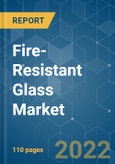The market for fire-resistant glass is expected to witness a CAGR of more than 9% during the forecast period. Increasing construction activities in the Asia-Pacific region, along with growing stringent fire safety norms pertaining to the construction of buildings, are the major factors driving the market studied. Moreover, rising demand for fireproof cabins in ships used in naval and commercial applications, increasing investments in the marine industry in North America, and the European region are other factors that stimulate the market demand. High prices and quality control issues are expected to hinder the growth of the market studied.
Key Highlights
- Ceramic glass is expected to grow at a significant rate during the forecast period as this type of glass has a fire-resistance from 20 minutes to 3 hours. Superior properties such as sound insulation and the ability to withstand thermal shock are likely to enhance the demand for ceramic-based fire-resistant glass.
- North America dominated the market across the globe with the largest consumption from countries, such as the United States and Canada. Strong regulations pertaining to building safety and fire safety in the region is likely to promulgate the regional market demand.
Key Market Trends
Increasing Demand from the Construction Sector
- Fire-resistant glasses have a wide range of usage in several applications such as glazing, windows, and doors as these products have superior properties such as resisting abilities that prevent fire, smoke, and heat to spread, and thereby is driving market demand in the construction sector.
- Building regulations apply to the construction of new buildings and to extensions and material alterations to the buildings. These safety laws on building construction have been following at a rapid pace in the interior surfaces and glasses for protection against fire hazards.
- According to the Indian Brand Equity Foundation (IBEF), the Indian real estate industry is likely to reach USD 1 trillion by 2030 and may contribute approximately 13% to the country’s GDP by 2025.
- Germany has the largest construction industry in Europe. The residential construction segment is expected to have moderately high growth. According to industry experts, the recent positive migration to the country is stimulating the demand for new residential construction. It is estimated that 3.6 million migrants are expected to arrive in Germany by 2020, requiring at least 350,000 new dwellings per year, which is expected to boost the construction sector. However, new housing demand will decrease to around 260,000 per year by 2025 and to 246,000 by 2030.
- Owing to all the above-mentioned factors, the fire-resistant glass market is expected to grow rapidly over the forecast period.
North America to Dominate the Market
- The North American region dominated the global market share. With growing applications in countries, such as the United States and Canada, the utilization of fire-resistant glass is increasing in the region.
- In the United States, The National Fire Protection Association (NFPA) was founded by insurance companies for standardizing the new market of fire sprinkler systems. NFPA created a set of codes named Comprehensive Consensus Codes, which include NFPA 5000 as the central building code, NFPA 101, and Life Safety Code.
- The codes explained in detail the minimum requirements for protecting occupants against toxic fumes, smoke, and fire in new and existing buildings. This is expected to lead to a growth of the fireproofing coatings market. 39 states in the United States adopted the NFPA 101 and the Life Safety Code, ensuring that buildings are protected, as well as all systems and services are correctly maintained. Such strict regulations pertaining to fire safety and building safety in the country is expected to boost product demand in the coming years.
- The University of Illinois at Chicago (UIC) has announced plans for a USD 95 million Center for the Arts to be built on its campus. The 88,000 sq. ft building will be used primarily by the UIC’s School of Theatre & Music.
- The government’s investment in public and renewable energy infrastructure, through Affordable Housing Initiative (AHI), Made in Canada, and New Building Canada Plan (NBCP), among others, is further expected to support the country’s growth in the near future and is likely to drive the demand for fire-resistant glass market in the country over the forecast period.
- Some of the leading companies in the production of fire-resistant glass in North America are AGC Inc. (Asahi Glass), Nippon Sheet Glass Co., Ltd, Saint-Gobain, SAFTI FIRST, and Anemostat Door Products.
- The aforementioned factors, coupled with government regulations, are contributing to the increasing demand for fire-resistant glass during the forecast period.
Competitive Landscape
The fire-resistant glass market is fragmented, with the top five players accounting for a major share of the market. The major companies include AGC Inc. (Asahi Glass), Schott AG, Nippon Sheet Glass Co. Ltd, Press Glass SA, and Saint-Gobain.
Additional Benefits:
- The market estimate (ME) sheet in Excel format
- 3 months of analyst support
This product will be delivered within 2 business days.
Table of Contents
Companies Mentioned (Partial List)
A selection of companies mentioned in this report includes, but is not limited to:
- AGC Inc. (Asahi Glass)
- Anemostat Door Products
- Glass Specialized Industries (GSI) Co. Ltd
- Nippon Sheet Glass Co. Ltd
- Press Glass SA
- Promat
- Pyroguard
- Ravensby Glass Co. Ltd
- SAFTI FIRST
- Saint-Gobain
- SCHOTT AG
Methodology

LOADING...








